Asphalt Shingle Lifespan: Detailed Guide
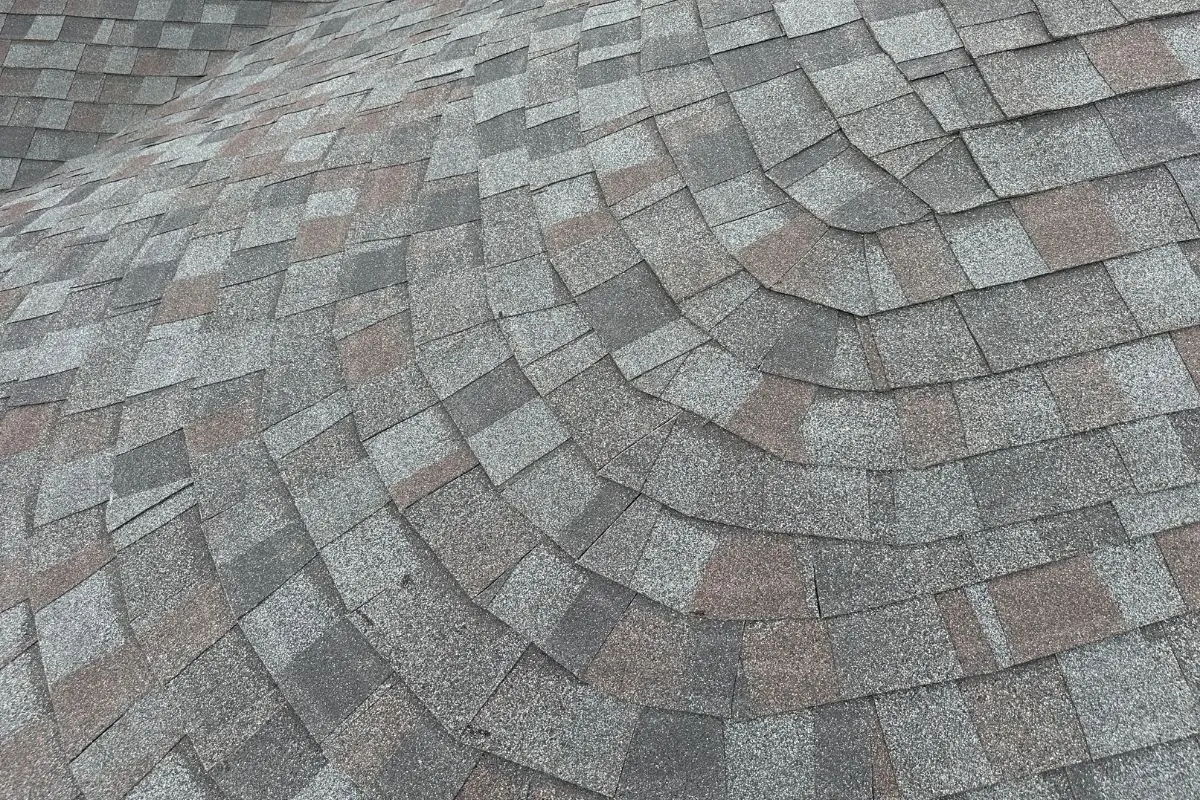
As a Tennessee homeowner, your roof is your first line of defense against the elements. From the sweltering summer sun to the occasional winter flurry, your roof bears the brunt of it all. Asphalt shingles are a popular choice in the Volunteer State for their affordability and versatility, but how long do they really last?
This comprehensive guide will explore the lifespan of asphalt shingles in Tennessee, the factors that influence their longevity, and how to maximize your roofing investment.
Types of Asphalt Shingles: A Tennessee Homeowner’s Guide
Not all asphalt shingles are created equal. In Tennessee, you’ll typically encounter three main types, each with its own lifespan and characteristics:
- 3-Tab Shingles: These are the most basic and affordable option, typically lasting 15-20 years in Tennessee’s climate. Due to their single-layer construction, they are more susceptible to wind damage.
- Architectural Shingles (or Dimensional Shingles): The most popular choice for Tennessee homeowners, these offer a multi-layered, laminated construction. You can expect architectural shingles, such as those made by Owens Corning, to last 20-30 years in Tennessee. Their thickness and weight offer better resistance to wind and hail.
- Luxury Shingles (or Designer Shingles): The thickest and heaviest asphalt shingles, offering the greatest protection. With a lifespan of 30-50 years, luxury shingles are a long-term investment that can withstand the harshest Tennessee weather conditions.
What Really Affects Your Roof’s Lifespan in Tennessee?
The lifespan of your asphalt shingle roof isn’t just about the type of shingle you choose. Several local factors specific to Tennessee can play a significant role:
1. Installation Quality: The Difference Between 15 and 30 Years
This is arguably the most critical factor. A poorly installed roof, even with the best materials, will fail prematurely. It’s crucial to hire a reputable, licensed, and insured roofing contractor in Tennessee who has experience with our local building codes and climate.
Poor installation practices that severely reduce your roof’s lifespan include:
- Reusing Flashing: Metal flashing around chimneys, vents, and valleys is designed to direct water away. Reusing old, fatigued, or bent flashing creates immediate weak points where water will eventually penetrate, leading to premature leaks and wood rot. Always insist on new flashing.
- Misalignment of Shingles: When shingles are misaligned or fastened incorrectly (e.g., nailed too high, or “high-nailed”), the adhesive strip can’t properly seal. This prevents the shingles from locking down, making them extremely susceptible to blow-offs during high winds.
- Re-shingling Over an Existing Shingle Roof: Layering new shingles over old ones voids most manufacturer warranties. This traps moisture, adds excessive weight to your roof deck, and prevents the new shingles from lying flat and sealing properly, leading to a drastically reduced lifespan.
- Improper Underlayment: Skipping the underlayment or installing it incorrectly leaves your roof deck vulnerable to water intrusion, rot, and mold.
- Improper Application on Low-Slope Areas: Asphalt shingles are designed for sloped roofs (typically a pitch of 4:12 or greater). If a roofer installs standard asphalt shingles on a low-slope roof section (e.g., a porch or addition with a pitch less than 2:12), water will not shed quickly enough. The water will pool and eventually back up under the shingles, where flat roofing materials like modified bitumen or TPO should have been used instead, leading to immediate failure and leaks.
2. Attic Ventilation: Not Just About Heat
Tennessee’s hot and humid summers make proper attic ventilation essential. Not seeing proper intake and exhaust venting is a major red flag. Without a continuous airflow system, heat and moisture can build up in your attic, “cooking” your shingles from the inside out and leading to premature aging, curling, and blistering.
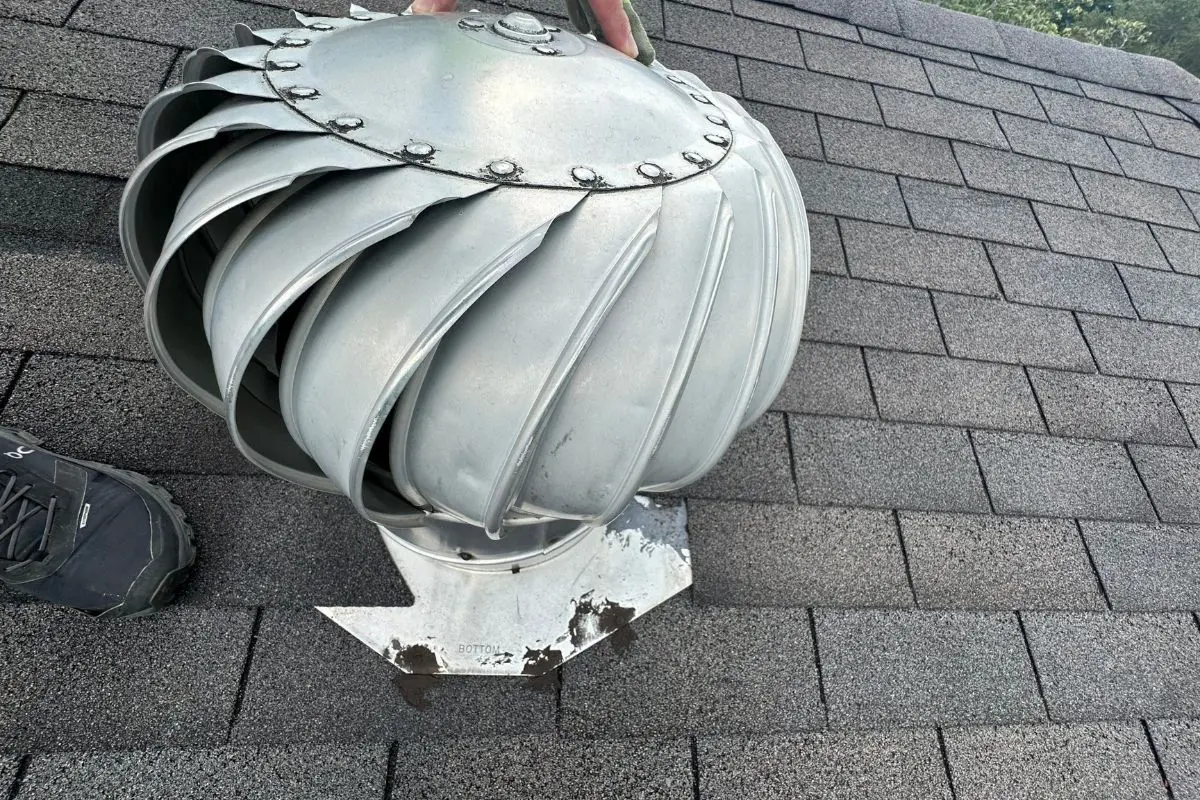
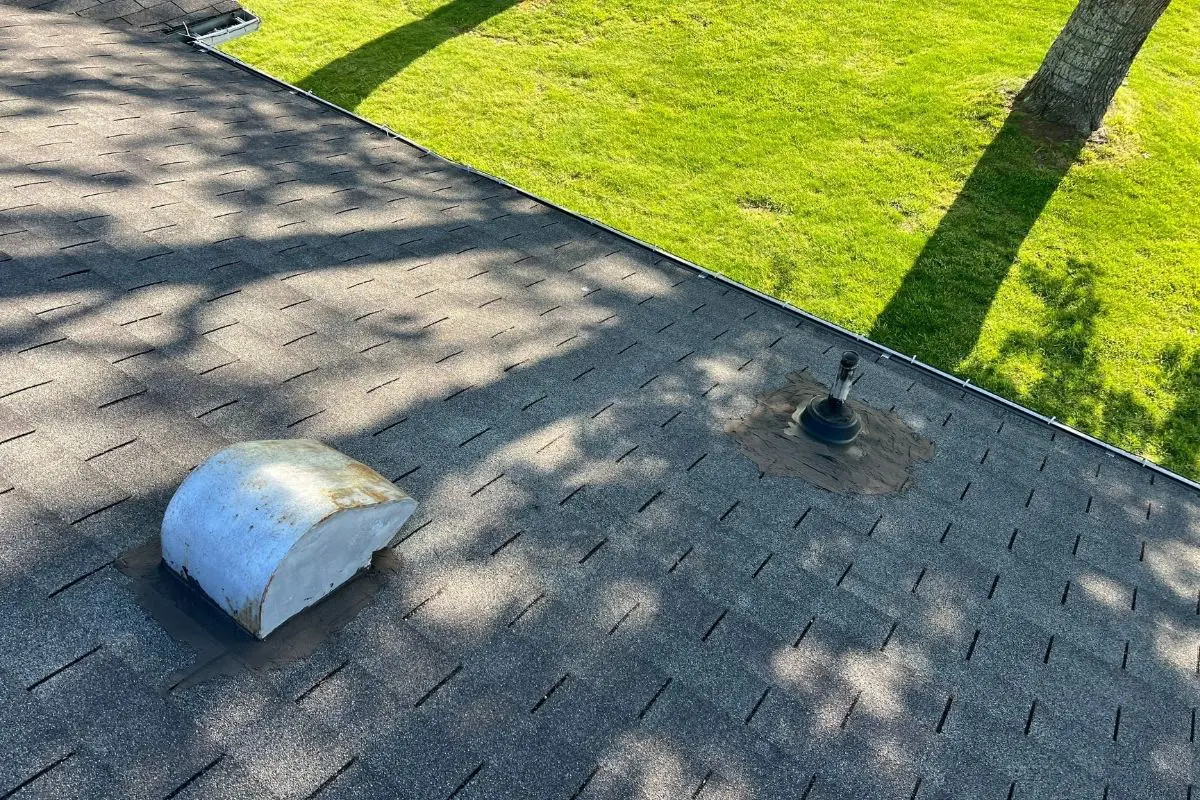
3. Tennessee’s Climate and Storm Damage
Our state experiences a wide range of weather, from intense summer heat and UV exposure to thunderstorms and winter storms. These elements take a toll on your roof over time.
- Intense Summer Heat and UV: Sun exposure causes the asphalt to dry out and the protective granules to shed (a process called “granule loss”). Once the granules are gone, the underlying asphalt is exposed, accelerating deterioration.
- Storm Damage (Hail and Wind): Tennessee is prone to severe weather events. Hail damage can appear as small, dark, circular impact marks that bruise the shingle mat, breaking the fiberglass reinforcement and loosening the protective granules. This accelerates water intrusion. High winds can lift unsealed shingles, bending, creasing, or tearing them, leading to immediate leaks. Even if the damage isn’t obvious, a professional inspection after a major storm is crucial.
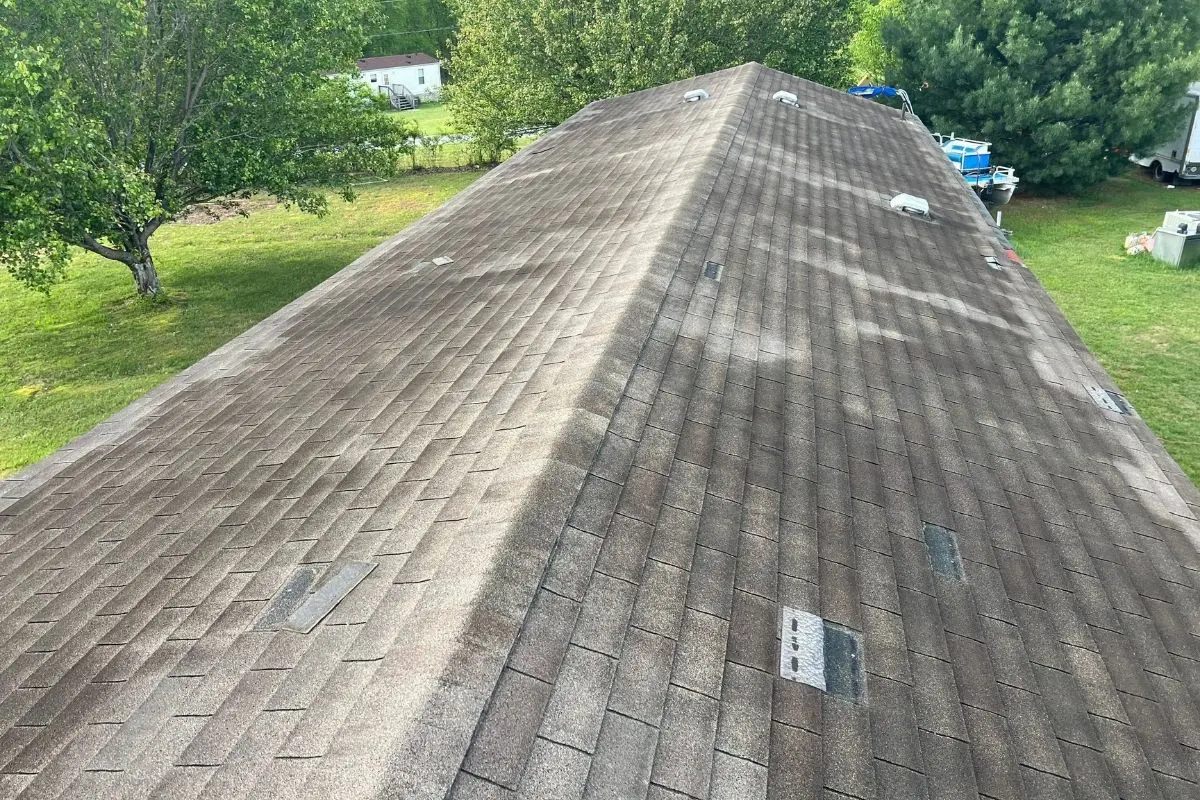
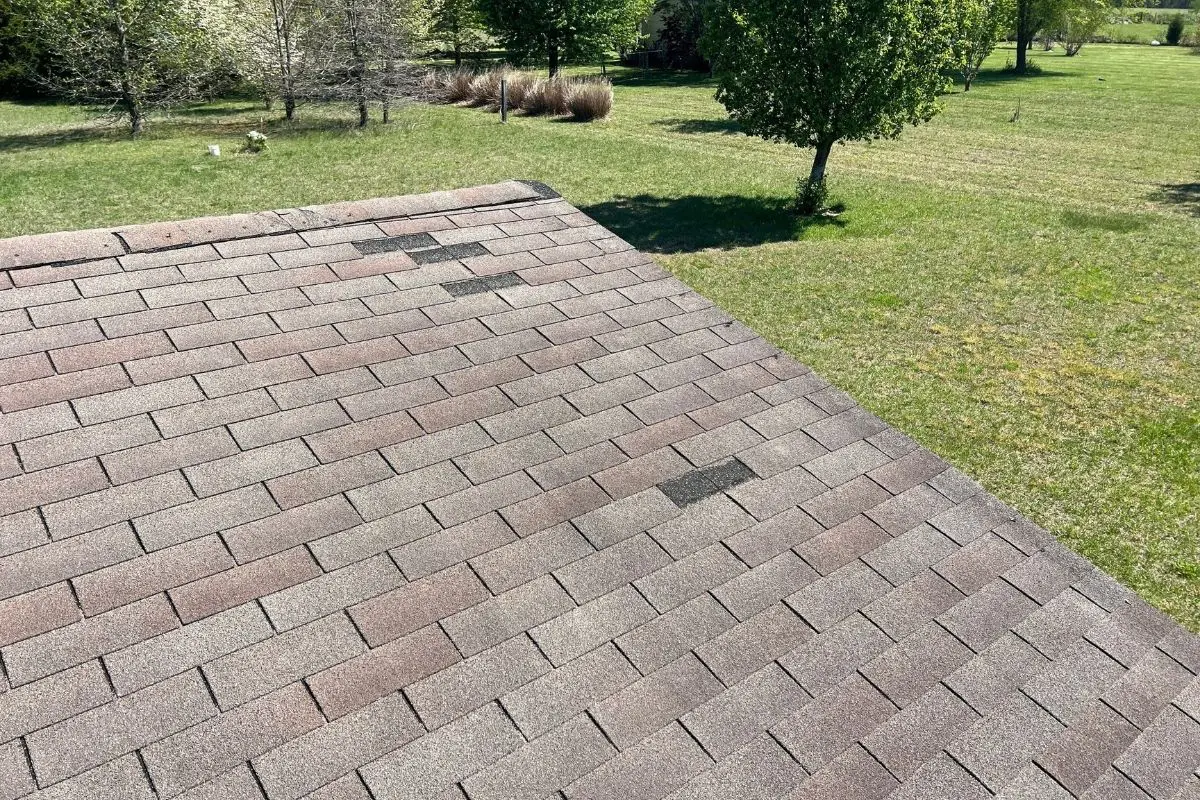
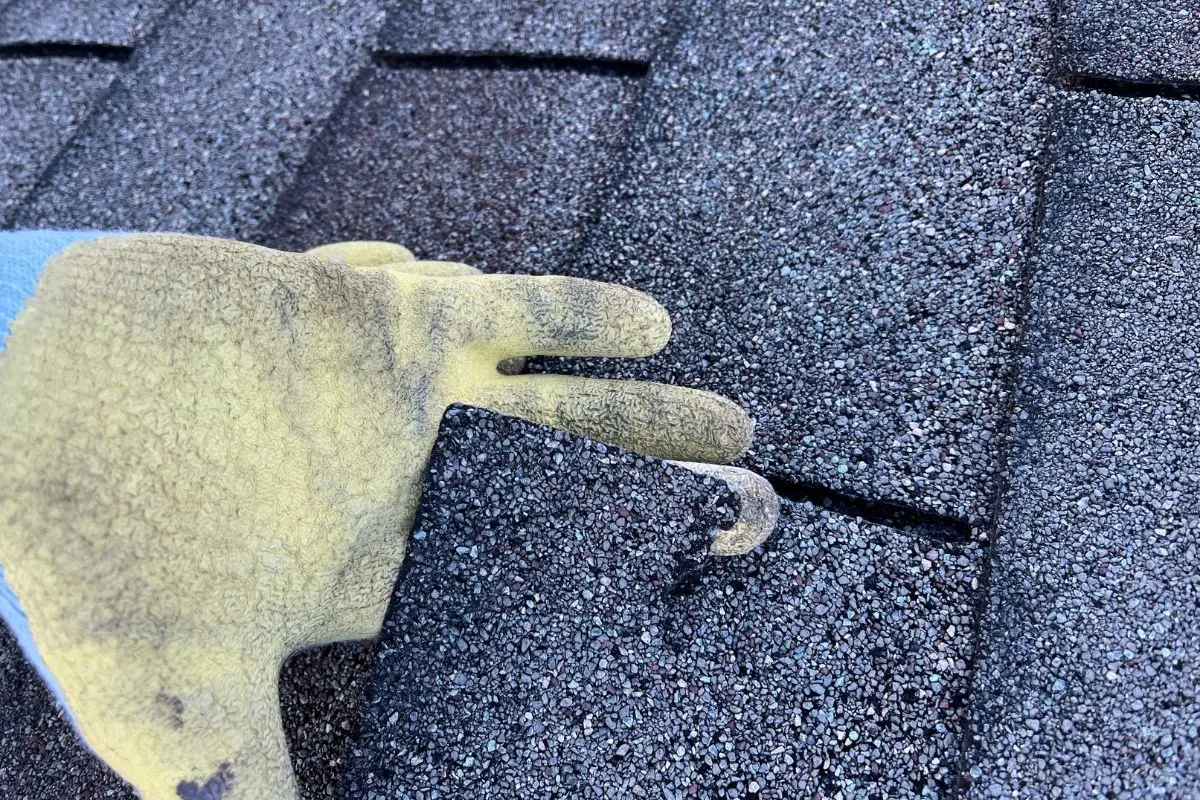
4. Roof Direction and Slope:
South-facing roofs in Tennessee get more direct sunlight and will age faster than north-facing roofs. Steeper slopes tend to shed water more effectively.
5. Overhanging Trees:
Falling leaves and pine needles can trap moisture and promote algae growth, while falling branches can cause direct physical damage.
6. Maintenance: Prevention is Key
Regular roof inspections and maintenance are key to extending the life of your asphalt shingles.
- Visual Inspections: Perform a visual inspection from the ground twice a year (ideally spring and fall) and after any major storm to check for obvious issues like missing shingles or excessive granule loss.
- Professional Inspections: Schedule a professional, comprehensive roof inspection every five years to catch subtle issues that are not visible from the ground, such as vent collar decay or minor flashing issues.
- Poor Maintenance (Overfilled Gutters): A common maintenance failure is neglecting gutters. Overfilled gutters packed with leaves and debris prevent water from draining properly. Instead, water pools at the roof’s edge and seeps underneath shingles, leading to wood rot and degradation of the shingle edge, dramatically shortening the roof’s life.
The Smart Investment: Comprehensive Warranties
Understanding roofing warranties is crucial for protecting your investment. There are two main types, and knowing their scope is vital:
|
Warranty Type |
What It Typically Covers |
Why It Matters |
|
Manufacturer’s Warranty |
Defects in the roofing materials themselves (e.g., shingles curling prematurely due to a manufacturing flaw). Standard coverage often only includes prorated materials. |
This protects you if the Owens Corning shingles themselves are defective. |
|
Workmanship Warranty |
Errors in the installation process (e.g., misaligned shingles, faulty flashing installation, or improper nailing). Provided by your roofing contractor. |
This protects you from the all-too-common human errors made during installation. |
The Importance of the Roofer/Materials Connection
To actually take advantage of your protection, especially the extended warranties offered by a company like Owens Corning, you need an integrated system:
- Standard vs. Enhanced Warranty: A standard warranty from Owens Corning often only covers replacement materials on a prorated basis after the initial few years, leaving you to pay the high cost of labor. The best protection comes when you choose a contractor who is certified by the shingle manufacturer (e.g., an Owens Corning Platinum Preferred Contractor).
- The System Advantage: These certified roofers can offer an enhanced system warranty. This top-tier coverage is critical because it often covers both the cost of the materials AND the labor for a longer period (often up to 50 years) and requires the use of a complete roofing system (shingles, underlayment, and vents from Owens Corning). This integrated approach ensures the manufacturer stands behind the whole system and helps prevent them from denying a claim by blaming the installer.
Beyond Standard Coverage:
In addition to traditional warranties, some Tennessee contractors offer specialized coverage due to our severe weather:
Roof MD Storm Warranty: This type of specialized plan is designed to cover common storm repairs that often fall below your homeowner’s insurance deductible. For example, it typically covers minor wind or hail damage requiring the replacement of a few bundles of shingles, emergency tarp services, and professional assistance with the insurance claim process—all services that can save you significant out-of-pocket costs after a minor storm hits.
The Bottom Line: Maximizing Your Roofing Investment in Tennessee
For most Tennessee homeowners, architectural shingles offer the best combination of durability, longevity, and value. They are well-suited to our state’s climate and provide excellent protection for your home.
To get the most out of your investment, remember to:
- Choose a reputable, local, and certified roofing contractor: A certification like the ones offered by Owens Corning is your best protection for maximizing your warranty coverage.
- Don’t skimp on ventilation: Ensure your attic has proper intake and exhaust ventilation to prevent premature aging.
- Schedule regular inspections and maintenance: Be proactive about cleaning those gutters, performing twice-yearly visual inspections, and getting a professional inspection every five years.
By understanding the factors that affect the lifespan of your asphalt shingles and taking a proactive approach to maintenance, you can ensure that your Tennessee home is protected for years to come.
